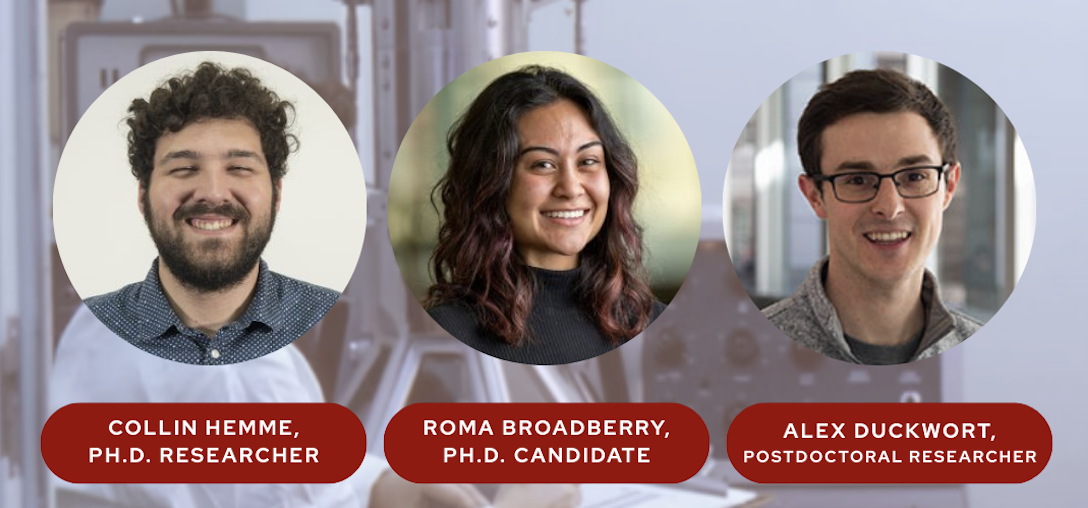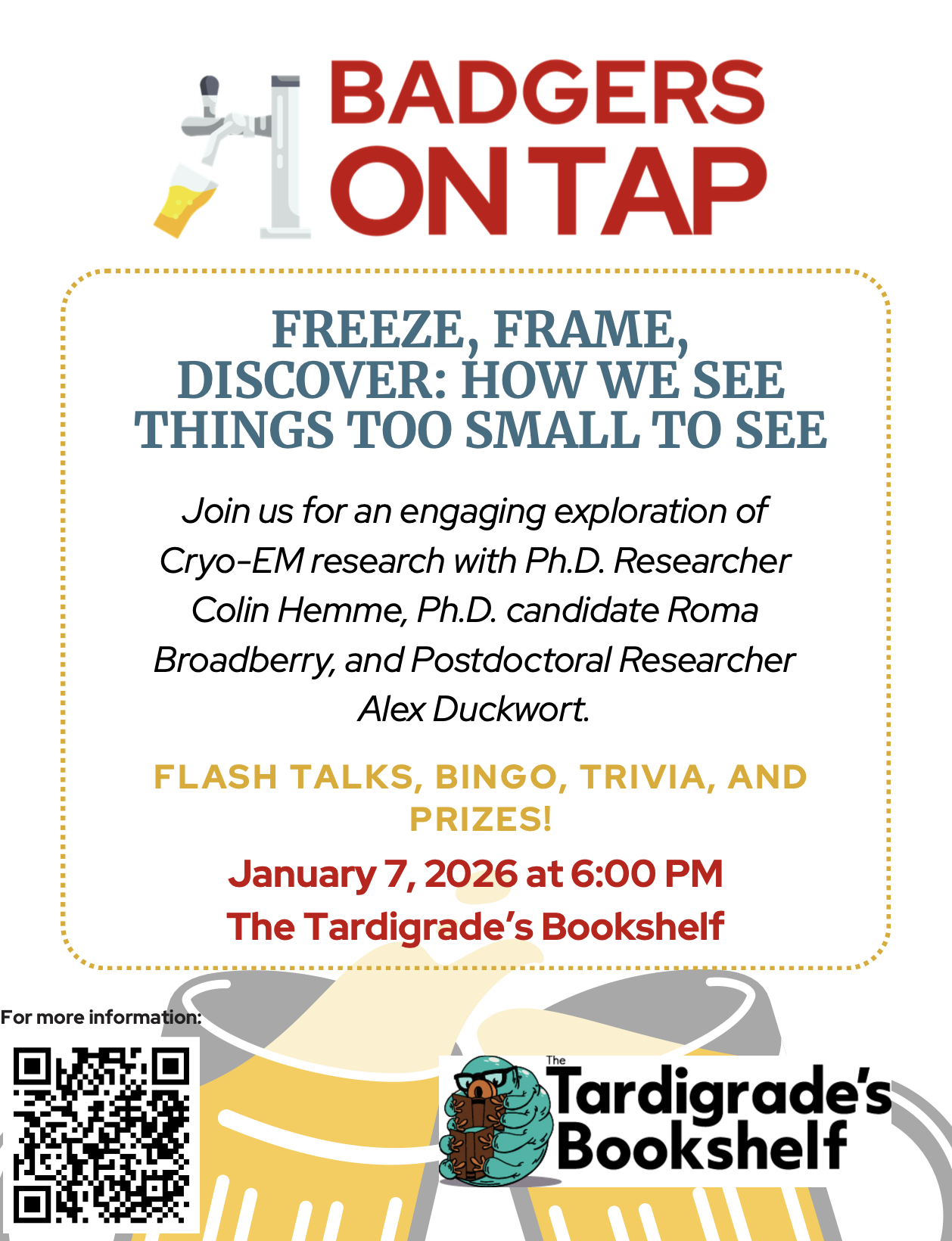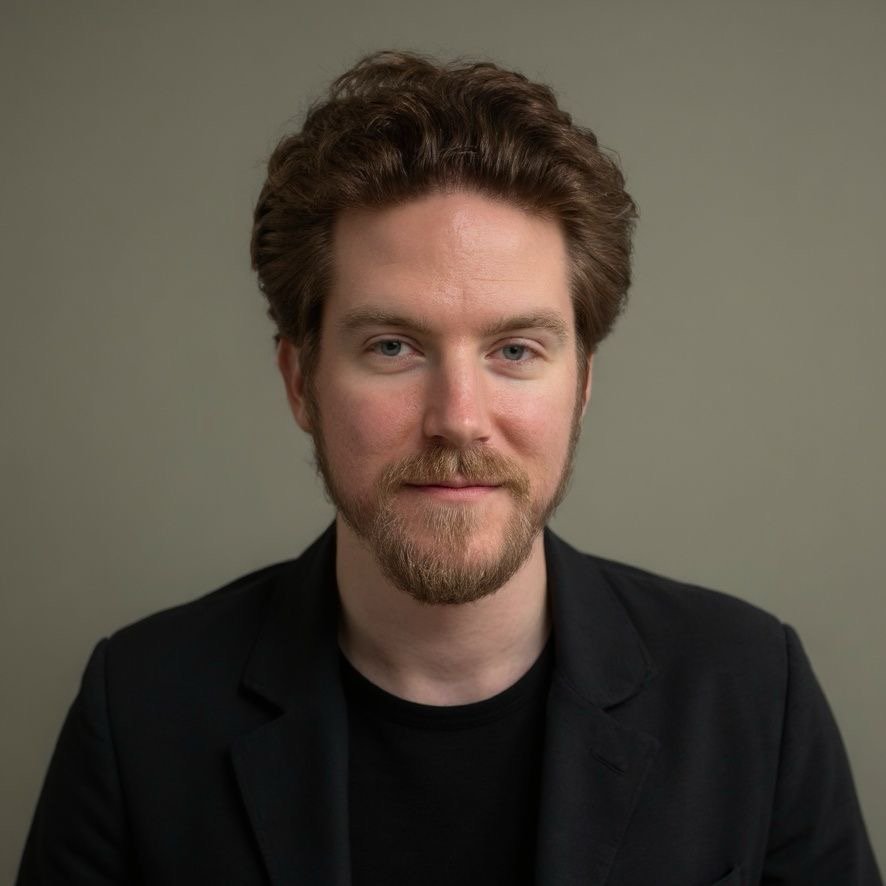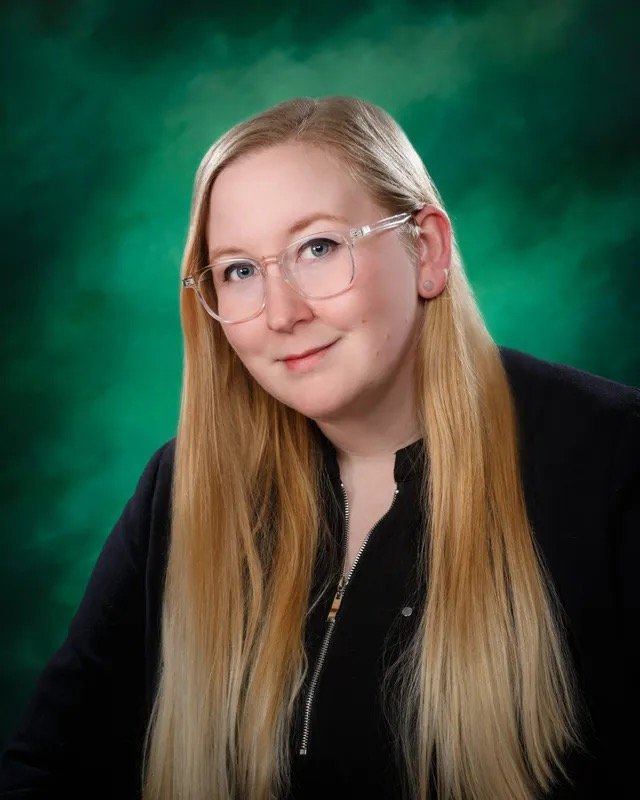
Fox Valley Science Society
A Monthly Gathering for the Incurably Curious
Welcome to the Fox Valley Science Society, a monthly event series at Tardigrade’s Bookshelf dedicated to making science social, accessible, and a little bit rowdy (in a nerdy kind of way). Inspired by the innovative Underground Science Society program in Milwaukee, this series brings together scientists, science enthusiasts, and the science-curious for engaging evenings of learning and connection.
Held the first Wednesday of every month at 6pm, our events take place in our events space with seating for up to 50 guests. Tickets are $5, which helps support speaker honorariums and event programming. Complementary tickets for members.
Speakers:
January 7, 2026
Freeze, Frame, Discover | How we see things too small to see
We’re thrilled to share that Fox Valley Science Society is partnering with Badgers on Tap, a program from UW–Madison’s Badger Talks initiative that brings university experts out into the community—similar to our previous talks but with an even broader reach!
The presentation in January will be led by UW researchers and educators.
Expect fascinating science, engaging games, and the kind of smart, friendly vibes that make you forget you’re technically “learning” on a weeknight.
December 3, 2025
Maxwell Wesenberg, DPT
Founder of Max Wellness Pain Relief LLC
This Might Hurt (But Maybe Not): How Your Brain Decides What Pain Is
We’ve all been told pain is the body’s alarm system — but what if that’s only part of the story? In this talk, Max will unpack the neuroscience behind pain, exploring how the brain interprets threat, sensation, and meaning to decide whether something hurts. He’ll explain the difference between nociception (the body’s detection of potential harm) and pain (the brain’s interpretation of that signal), showing how experiences, context, and even emotion shape what we feel.
Max also introduces the biopsychosocial model of pain, moving beyond the old “tissue damage = pain” idea to reveal the complex, layered reality of how our brains and bodies communicate. He’ll close with a brief look at his clinical work and emerging treatments like scrambler therapy that are changing the way we think about—and treat—chronic pain.
Speaker Bio:
Dr. Maxwell Wesenberg is a Doctor of Physical Therapy (DPT) and the founder of Max Wellness Pain Relief, where he specializes in using advanced technology to change how the brain interprets pain messages in patients where pain persists long after the injury has healed. He will discuss different types of pain and why conditions like CRPS, Fibromyalgia, Phantom Limb pain, and Stroke pain follow a different pattern than typical injury pain.
November 5, 2025
Mac Aulay Freed
Funeral Director & Embalmer
Formaldehyde & Humanity: The Science of Embalming and Saying Goodbye
This presentation takes an unflinching, science-informed look at what happens after death—and how funeral professionals guide the process with skill, compassion, and a touch of chemistry. From the first moments of care to final disposition, we’ll explore what really happens behind the scenes of modern funeral service.
We’ll follow the full journey from death to disposition, including the methods and purpose of embalming, how cremation works, and the expanding range of disposition options available today. There will be some honest detail—nothing gratuitous, but enough to satisfy the scientifically curious.
Finally, we’ll look at what it means to work in this field: the daily realities, emotional demands, and professional training behind one of society’s most essential (and least discussed) callings.
Speaker Bio:
Mac Aulay is a licensed funeral director and embalmer who found her calling in a second career devoted to caring for others. After working as a pharmacy technician, she felt drawn to support families through one of life’s most difficult moments.
A 34-year-old mom and lifelong learner, Mac Aulay completed her apprenticeship and schooling while working full time with her current firm, where she’s been for nearly four years. Licensed for just over a year, she continues to find deep purpose and fulfillment in the work she loves—helping people with compassion, skill, and a personal touch.
October 1, 2025
Kali Draeger, Evidence Specialist-Grand Chute Police Department
Forensics vs. Fiction: The Truth Behind the CSI Effect
Forensic science plays a crucial role in solving crimes, but thanks to shows like CSI and NCIS, the public often has an exaggerated idea of what it can really do. In this talk, we’ll explore how forensic techniques are actually used in investigations, what limitations they face, and how the so-called “CSI Effect” has influenced juries, trials, and the justice system as a whole.”
Speaker Bio:
Kali Draeger is an Evidence Specialist at the Grand Chute Police Department. Her role is to maintain all physical and digital evidence collected by the department, as well as respond to and process crime scenes that occur within Grand Chute. Kali is a Certified Property & Evidence Specialist through the IAPE (International Association for Property & Evidence) and a Certified Crime Scene Analyst through the IAI (International Association for Identification). She also serves on the Board of Directors for the WAI (Wisconsin Association for Identification) and is an adjunct instructor for Fox Valley Technical College’s Forensic Science program.
September 3, 2025
Dr. Ben Sajdak, UW Oshkosh & Fauna Bio
Evolving Superpowers:
The Science of Extreme Animal Adaptations
Many animals have evolved solutions to problems we face in disease. From bees to elephants, to the ground squirrels in your backyard, this will be a tour through some of the most shocking disease resistance adaptations found in the animal kingdom, and how these naturally evolved superpowers are inspiring new treatments for our most devastating diseases.
Speaker Bio:
Dr. Ben Sajdak is an adjunct professor of Biology at the University of Wisconsin Oshkosh and Director of Research at a startup company called Fauna Bio. He earned his BS in Biology from UW Oshkosh in 2013 and developed a passion for this very topic doing undergraduate research on hibernating ground squirrels with Dr. Dana Merriman. Then he went on to earn his PhD in the Neuroscience Doctoral Program at the Medical College of Wisconsin in 2018, where he did his dissertation on the need for better animal models for human blindness and developed expertise in translational biomedical imaging of patients and many animal species. He has helped launch innovative cross-disciplinary research divisions at each stage of his scientific career. He is passionate about exploring naturally evolved solutions to health problems in extreme animal adaptations and aspires to unlock similar disease resistance strategies in humans.
August 6, 2025
Dr. Megan Pickett, Lawrence University
The Meaning of Quantum:
Why The Most Successful Theory in Physics is Still a Mystery
Quantum Mechanics asks two simple questions: why does matter exist, and why can we see any of it? The answers revealed the strange, beautifully weird quantum world, in which probability and uncertainty rule, phenomena exist—or not—based on observation, and particles become entangled over light years. In the century since its founding, quantum theory has withstood every test thrown at it, making it arguably the most successful framework in all of physics. Every modern device in your life, from your phones to computers in your cars to medical imaging to fluorescent lights all work because quantum works.
And yet, the actual meaning of Quantum Mechanics remains maddeningly elusive. Nearly two dozen different interpretations have been offered: from pilot waves guiding particles to mysterious parallel worlds to the original, somewhat cynical Copenhagen philosophy of “Shut up and Calculate.” The debate within the scientific community has also encouraged a lot of pseudo-scientific malarkey, in which anything goes for the right price. Tonight’s talk will reflect Quantum’s successes, its history, and the leading ideas for what Quantum is—and what it isn’t.
Speaker Bio:
Dr. Megan Pickett is an associate professor of physics and chair of the Physics Department at Lawrence University. She earned her BA in Physics at Cornell University in 1988 and MA and PhD in Astrophysics from Indiana University in 1995. After IU, she was a National Research Council Fellow at NASA’s Ames Research Center until 1999, when she began her teaching career at Valparaiso University, Purdue University, and ultimately Lawrence University. She has written more than two dozen papers on the origins of Solar Systems and Gas Giant planets, as well as receiving several NASA and NSF grants. While at Lawrence, she has been awarded the First Year Studies Teaching Award, the Early Career Teaching Award, The Award for Teaching Excellence, and the Honors Faculty Convocation Award, which was later adapted into a TED talk (https://youtu.be/eYC93oQURPc?si=qpgTiSYxky5SU9W5). A native of Madison, she has worked in New York, Indiana, California, Washington, Munich, and Yorkshire.
July 2, 2025
Dr. Ryan Sprenger, NASA
Dr. Ryan Sprenger is currently NASA NAIC fellow at Fauna Bio as theSenior Physiologist. Dr. Sprenger earned his undergraduate and master’s degree in biology at the University of Wisconsin Oshkosh, before traveling to the University of British Columbia where he earned his PhD in Zoology and Physiology. He then moved back to Madison Wisconsin for postdoctoral work in neurodegenerative disease. Dr. Sprenger’s expertise is in cardio-pulmonary physiology, and he has spent a large portion of his career studying cardiac and pulmonary function in hibernation, neonatal development, and in Alzheimer’s disease. His current research is focused on the health effects of space travel on the central nervous system and the cardio-pulmonary systems, with an interest in human hibernation as a protective strategy.
Human presence in space has been continuous for the past 25 years starting in November, 2000. While the number of astronauts in space has been small to date, this number is projected to rise dramatically with deep space exploration becoming more frequent. Space, however, is hazardous. The health risks in space are both physiological and mental, caused by the hazards of space which are detailed in NASA’s RIDGE acronym (radiation, isolation, distance from earth, gravity, and extreme environments). Protection from these hazards is necessary to expand human presence in space. Dr. Ryan Sprenger will talk about the current knowledge of these hazards, and the type of research occurring (including some of his own) to find solutions to these risks allowing humans to travel further into the stars.






